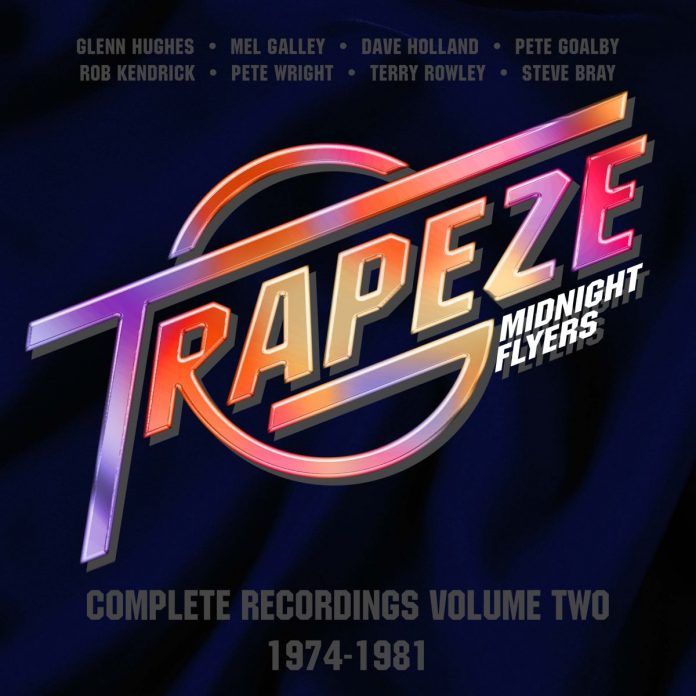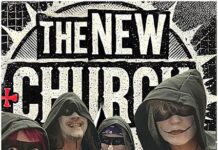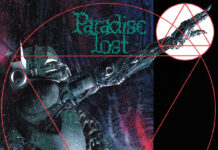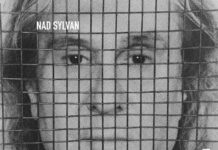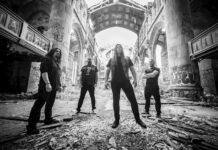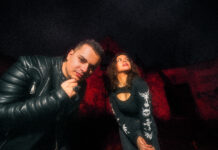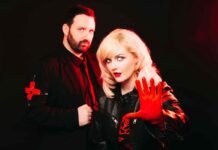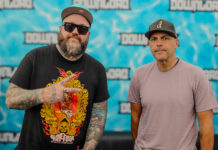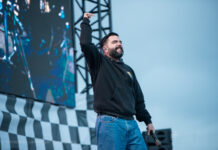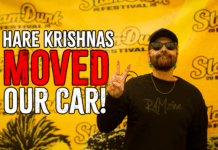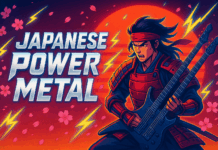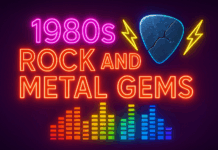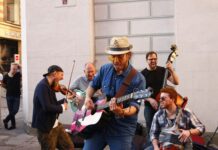The second volume in Cherry Red Records’ collection of rock band Trapeze’s official studio albums, plus live material, has been collected across five CDs. No diehard fan of the band is without copies of these records already, certainly not the studio releases, but these are undoubtedly intended for younger listeners and the newly curious who never cottoned on first time round.
That members of Trapeze went on to be associated with wider known acts such as Whitesnake, Judas Priest, Uriah Heep, Deep Purple, Budgie, and Black Sabbath to some degree or other is another attraction. Though they’ll not find overt similarities, not between those bands, and to some degree the albums either – Back in those days, bands evolved.
I recently came across some online copies of an early 70s IPC publication called Music Scene. They covered a period where they noted Glenn Hughes had joined Deep Purple as replacement to Roger Glover, and that a new four-piece line-up of Trapeze were preparing to tour. Nothing untoward, business as usual.
That Hughes had taken over as lead vocalist from the band’s second album (1970’s Trapeze on The Moody Blues’Threshold record label having been more of a shared harmony affair) and was making a name for himself in that regard on paper at least, sounded a loss to the Cannock-based band. His stated reason being he didn’t believe the record label could do enough to break the band into the big leagues, and Purple were already there. The financial recompense may have offset the fact he was largely relegated to playing bass with only the odd couplet or verse to sing.
Remaining Trapeze co-founders guitarist Mel Galley and drummer Dave Holland cast their net more locally when seeking new members. Original keyboard player Terry Rowley had never been more than a sound engineer’s desk away from them, and would return to perform on their new long player, also helping initiate a meeting with Pete Wright who became their new bass player and backing vocalist. A previous band Wright had played in had supported Pinkerton’s Assorted Colours, the sixties pop band Holland had been a member of, and it was the drummer who also recommended Rob Kendrick join as second guitarist, backing vocalist.
While Galley could take on further responsibility for the songs, co-writing with his brother Tom, without too much concern, that lead vocalist job would take some beating. That Mel Galley also stood up the plate to take on that role further redefined him as band leader, that he could sing well a pleasant surprise for all. I’ve latterly been told that Galley had a hard time putting his voice through consecutive nights of live vocal performance but on record it’s apparent he and Hughes had similar influences, and while nowhere near as far-reaching, his was rockier and would have suited blues rock audiences more for he had a throatier rasp, while when hitting higher notes, it felt genuine in its emotional expression coming directly from the man who’d co-written them.
Released in 1974, Hot Wire, was the first evidence of Galley’s vocal talents. As with previous You Are The Music… We’re Just The Band the back cover listed additional musicians to the record, including conga players, horns and female backing vocalists, while Neil Slaven continued in the role of producer.
Its front cover was much more American-orientated, a kind of electric light bulb come knickerbocker glory ice-cream in bright lurid colours. Personally, I’m still unconvinced that I care for it, but having newly signed to Warner Bros the American company presumably knew their market and helped it become the band’s highest selling record to date, reaching 146 in the Billboard Charts, back when physical records sold by the truckload.
The music too reflected the times. The guitars crunched harder, while the music was funkier than it had ever been; funkier in that old school grinding nomenclature rather than the disco fodder it became. That the USA, or at least pockets of it, had welcomed Trapeze was a feeling long reciprocated by the band, travelling between states and cities they soaked in the vast variety of music heard on assorted radio stations.
Rock was now big business, but it’s surprising to discover Billboard’s top selling artists for 1974 were The Carpenters, Jim Croce, then Bob Dylan. The Rolling Stones pitched in behind new acts like Bad Company and Bachman Turner Overdrive, and they were all way below many easy listening albums, though no doubt still selling in their millions.
Hot Wire featured music that was still a few miles south of the aforementioned rock acts. More direct influences could have been Grand Funk Railroad who were then on a roll, while deep album cuts by The Doobie Brothers bore favourable comparison, though it’s notable Galley is said to have been a fan of Little Feat, and while Humble Pie were about to begin a downward path in ’74, there remain remarkable positive similarities, from the two-guitar four piece rock/funk/soul sound to the black backing vocalists (one of whom on Hot Wire was in reality P.P. Arnold, who’d previously sang, and possibly shacked-up, with Marriott when he’d been in The Small Faces).
Whatever the forces at work, they proved a success. Despite which, for many years it was my least favourite Trapeze album, yet now my most played.
A guitar calls out sounding like it’s travelled deep into the southern states, is answered by another in higher pierced squeal and before it finishes a bass guitar note lands squarely followed by drums, the new rhythm section well up in the mix – Wright lays the bass down solidly but with room to breathe, not unlike the space Boz Burrell gave Bad Company, while Holland accentuates with a number of lively rolls around his kit, and the guitars latterly begin cranking out a taught riff. Galley begins relating the need to find comfort in what’s in the modern vernacular’s referred to as a sex worker (though few pay tax, I suspect); his voice raw, passionate, the band joining in on backing here on ‘Back Street Love’. Halfway through Wright quickens the pace with a funkier groove, while Holland now plays it straighter, guitars soloing over the top (and you’ll need proper stereo speakers to appreciate Galley and Kendrick’s varying approaches). Sturdier rock chorded verses follow, before they slow down to a groove, repurpose the beat and seemingly end but go straight into‘Take It On Down The Road’ – Their new sound established this is more of the same, but for the most part a more strident rock number, typically about life on the road, before three and half minutes in the pace quickens and Chris Mercer joins in on some really tasty sax.
‘Midnight Flyer’ proves a bonafide funk rocker, with guitars honking and chinking away as Galley sings with soulful glee, band collectively joining in with singular cries of “fly” and “higher” while he also hits a few notes shy of Hughes range for good measure, and Rowley’s synthesiser proves a nice musical detour. The track was soon established as part of their live set, but whether it’s about planes, drugs or whatever I’ve to this day no idea.
The rowdy ‘Wake Up, Shake Up’ is a funky blues rocker, that sounds like they’re having tremendous fun playing it, and despite its relative simplicity remains a firm favourite with me.
Riding in on a fat-assed bass line, while guitars shiver and shake either side, Galley’s vocal cords go for some Bee Gees styled falsettos, there are warmer female ones reciprocating, some more delicious synth from Rowley, and guitar solos that stetch out on ‘Turn It On’ – A number that’s lyrically the prequel to ‘Back Street Love’. That in closure they get incredibly heavy, with Holland particularly playing the changes with dynamic aplomb something one tends to forget.
Credited to the Galley brothers and Holland, ‘Steal A Mile’ has long been a favourite. R ‘n B guitars skip with such light-hearted content through this number, varying both melody and latter tempo too, all catchy as hell with a groovy laidback feel. Lyrically, it’s like the bed partner to the band’s Medusa album classic ‘Black Cloud’ but less embittered and living for the moment – as I type the sun is out, and it’s definitely a tune for such days. Following naturally is ‘Goin’ Home’, there are similar licks present but presented a harder blues rock manner (and not a million miles removed from ZZ Top or Foghat’s material around the same period), while the soul-searching journey of the previous number feels suitably achieved here. That halfway through there’s feedback sustaining guitars that borders on experimental fusion and prog but still fits nicely within the song’s structure shows how flexible this line-up was.
The album concludes with ‘Feel It Inside’, an absolute funky rock monster, that’s the missing link between Sly & The Family Stone and Extreme – That it out-souls what Humble Pie were doing with The Blackberries as their backing vocalists, with The Flirtations’ Misty Browning, and as I believe, P.P. Arnold, is saying something. Galley appropriating a harsh roar in contrast to the female wails, croons and come-back lines, the number runs just under nine minutes, played completely in the pocket it’s tight but the band (and additional players) also get to stetch out adding a rockier edge at times, and Rowley delighting on electric piano. Should the band have continued in this vein, with the extended line-appearing live they might’ve transformed into an alternative version of The Average White Band, as it was, they headed out to the USA, performing in front of 20,000 fans regularly in the Southern states, and appearing on bills with other acts elsewhere, not least a festival date headlined by The Rolling Stones, with The Eagles and Montrose performing. But, here in 2023, to say Hot Wire offered diversity is an understatement.
A year down the road, lots of established bands were adding more funk, reggae and commercial pop elements, from Led Zeppelin down. Over in Deep Purple, Hughes’ influence had grown within the band, and while he has been chastised as culprit for subsequent record sales going down that’s not completely fair; the times were changing, and Purple’s then biker-strong fan base weren’t quite ready for Stevie Wonder vocal gymnastics.
Back at the Cannock stronghold, Galley, Wright, Holland and Kendrick may have sensed the tide would turn musically over in the USA. Rock would remain big business, but newer acts, homegrown, applying the formula that if Zeppelin and Yes were spending a year recording, or Heep and ELP playing elsewhere in the world, combining both elements could prove an advantage, and thus was formed pomp rock, ranging from Styx to Rush at some point in their careers.
For their next release, Trapeze, the funk took a slight backstep, more in-in-your-face rock elements were present but so too more challenging arrangements on some songs, keyboards and horns part of that rather than acting as featured elements, though neither are credited. That stated, sometimes the differences in musical styles feel at odd partnered alongside each other on record, still co-written by the Galleys, with a few penned only by Mel, some have pointed towards bringing in Steve Smith as producer, as a likely reason. This change presumably down to Warner Brothers, and with regard marketing decisions too. Why else have your fifth album titled the same as your first one? Getting the band’s name across, seemed to be the intention, and having a proper diagonally sloped logo emblazoned across was in this case a smart move, and they should have maintained its use on subsequent releases.
The back cover featured the band sweat-soaked in all out action live on stage. I gather there was a poster too, but having latterly bought my vinyl copy second hand, as a schoolboy, with little cash to spare, I do recall is Cyclops record store in Birmingham heavily promoting the album in their front window.
The album begins full-on with ‘Star Breaker’, and as with the previous Hot Wire, a guitar calls out and the rhythm section respond heftily in the affirmative. A harder rock sound, more akin to what Galley would provide for Whitesnake then ensues as he spits out his venom for promises broken in the music business. Bold, abrasive, there are also moments of “Screw you!” dirty funk elements with brass and wah-wah guitar breaking out.
Calmer, more reflective is ‘It’s Alright’, a Midwest country rocker with soothing harmonies, more Little Feat/Doobie Brothers, not least the way the slide guitar weaves its way through. Following it with another light acoustic or ballad number in ‘Chances’ remains an odd placement, listening to it consecutively on album, as intended. Sung by Hughes, returning as guest, in-and-of-itself, you can hardly complain, he’s in top form, with what must be Rowley on the deftest application of keyboards, gentle and touching. There also exists a version of this with Galley on vocals, maybe one day there’ll be an official release.
‘The Raid’ is next. On the one hand, I tend to think of it as a rowdy barrage of loud guitars, befitting the back cover, then when you least expect it, the guitars play out a funky call and response with each other, at others there’s jazzy R ‘n B organ soloing over the rhythm section making out like a Latin dance duo. Presumably intended as a rallying call to fans that the band was ready to play and entertain. Rocked up for our pleasure is a cover of ‘Sunny Side Of The Street’, that’s probably more applicable for a boogie blues band than one that’s self-penned all its own songs thus far. It has charm, but beyond that I remain confused as to its inclusion.
Common sense returns with ‘Gimme Good Love’, a sturdy impassioned rocker with sweltering organ, of the kind Paul Weller subsequently made a healthy career playing. ‘Monkey’ follows adding grinding funk, while ‘I Need You’ is a kissing cousin to the earlier ‘It’s Alright’ in both theme and style, before doing a little rocking out near the end. Once more, good as it might be, it doesn’t quite hold together in terms of placement on this record.
The mighty ‘Soul Stealer’ can again be compared with opening number ‘Star Breaker’, both in its lyrical themes and in more extravagant use of arrangement – Though largely hard rocking, with those trademark Trapeze licks delivered along the way, there are also more pomp rock sections where keyboards are prominent with Wright’s bass melodies counterpointing delightfully.
‘Nothin’ For Nothing’ sees the album out, and again features Hughes vocally. In the one sense it hinted at the more straight-on rock their next studio album, Hold On, would take them, but while decent it’s not a stand out. A kind of southern rocker, I suppose. Placed somewhere in the middle of the original B side of the album, and ending the album with something with more aplomb like ‘Soul Stealer’ might’ve left a more lasting impression of the album overall.
If they’d headed back out to the states with a fulltime onstage keyboard player, performing the strongly arranged numbers as part of their set, who knows if further pomp rock opportunities might’ve been for the taking. As it was, they planned a string of UK dates, their appearance in Nottingham, latterly released on CD as Live At The Boat Club – A raucous collection of the usual classic band tracks played live, alongside numbers from Trapeze, and just one from Hot Wire.
With ‘Back Street Love’ it’s great to hear the guitars let rip, and while there’s a short quiet blip in the vocals and the drums initially sound a tad tinny, ignore those moments and enjoy. By contrast, the guitars are lighter on ‘You Are The Music’, taking advantage of both Galley and Kendrick they dance playfully, driving down hard together on the celebratory chorus. ‘Jury’ follows, with two effects-driven guitars allowing the quieter intro an ambiance not present on the live trio releases, Galley in particularly good form vocally, and he really gives it some on the solo that begins just shy of the five-minute mark, with other interludes maintaining our interest too, and they have to because it runs to just under 14 minutes, it all coming on like Armageddon in the last minute or so, making you wonder if members of Judas Priest were in the audience taking note, and not just about nicking the drummer.
Galley announces ‘Star Breaker’, and that the new album’s not out yet. Shorn of the horns, it takes on a more direct rock sound, fitting into their set seamlessly, and the applause indicates the fans approve. The nervous edged funk rock of ‘Way Back To The Bone’ and the dynamics between this line-up add positively, though it’s true some might consider it goes on a bit too long, as on the souled-out sections. “’Ere’s an old favourite,” Galley calls out in his Staffordshire patois, and they perform ‘Medusa’, however vocally it tends to lack power while musically they tend to bludgeon their way through the first half, albeit there’s more spirited life in the latter part. The fans don’t care their applause gets louder, and then they finish their set with a 15 minute long ‘Black Cloud’.
A taught rocker on the Medusa album, here the guitars wail about in solo before hitting the number’s power chords. It’s performed loud, raw, with a party attitude though here and earlier Galley’s calls for crowd interaction don’t illicit much in the way of vocal response, save until the end. That before they even get half way through the band are breaking the song down, establishing various grooves, bass, drums and guitars all equally effective and enjoyable, before rocking back into the main tune only three minutes before concluding.
Curiously, they encore with two numbers yet to be released from the Trapeze album. Chugging in boogie fashion they launch into ‘Sunny Side Of The Street’, that live after a few beers probably worked for the audience gathered. Following it with ‘The Raid’ there must have been a lot of sweat and adrenalin pumped out that night back in 1975.
During the set, Galley expressed that they hoped to see their fans again real soon. However, he, Holland and Rowley temporarily reconfigured with Hughes for an incomplete tour in the States, further detouring by joining Moody Blues’ offshoot The Bluejays. Ultimately, it impacted on the current Trapeze band’s chance for further success.
That US tour was bootlegged, and subsequently appeared on the internet. The Texas Hall Auditorium show on 12th September 1976 now has an official release as CD4 in Cherry Reds’ Midnight Flyers boxset, under the title, Live At Arlington.
With the vintage ‘You Are The Music’, ‘Medusa’, ‘Coast To Coast’, ‘Seafull’, ‘Jury’ and ‘Way Back To The Bone’ predictably making up the bulk of the set. If you’ve Don’t Stop The Music, the first volume in Cherry Red’s boxset collections, or the individual album releases where live shows are included as bonuses, you might consider these one too many renditions. However, hearing Hughes and Galley sing in tandem, proves that them not doing so more regularly, not least in the studio, was a missed opportunity. Whether Galley had changed over to other makes of guitar in this period others can confirm, but there’s a distinct modernisation, for the times, to the brighter tone of his playing.
The only post-Hughes line-up number featured is ‘Midnight Flyer’, with Galley taking lead vocals and sole six string duties, the song’s performed even and direct, though Hughes taking the higher vocal lines in the chorus works well.
The remaining songs were ones that hadn’t yet been released, and for the audience present would only have been available on import. ‘L.A. Cutoff’ and ‘Space High’ were from Hughes’ first solo album, Play Me Out – Released in Germany the following year, through Purple Records subsidiary Safari Records, then latterly in 1978, the UK, if you could find it. Punk rock had been and was nearly gone by then on British shores, so there was no place for a record that owed more to Stevie Wonder, good as it remains to this day.
That Hughes tells the crowd ‘L.A. Cutoff’ is from a new album “coming out in November” may well have had that audience presuming he was referring to a new Trapeze one, and as performed here it’s a rockier affair, if not a little fusion involved too with Galley stretching out experimentally on guitar. Similarly, ‘Space High’ loses the high-sheen soul layers of its studio rendition, more a trundling blues rock rendition over which Galley adds west coast funk, and Hughes delivers some exception vocals. Terry Rowley is also introduced for an onstage appearance, though you can hear his synthesiser creating sound effects on other tracks.
This appears to be a much better produced version of the tracks from Arlington than have been heard before, less distortion, more balanced in sound. So, worth hearing. As far as history and those still around recall, the new tracks were always intended for a Hughes solo album, though it’s true Holland and Galley played on all the Play Me Out tracks (with horns, added guitars and the like added later over in the States), and the album cut ‘Destiny’, credited to Galley, Holland and Hughes really pointed towards what could have been.
With Kendrick having moved onto play lead guitar with Budgie while these external activities were going on, Holland, Galley and Wright brought in Pete Goalby, formerly of Fable, as lead vocalist and guitarist. In a trial-by-fire moment, he was presented to the world, or at least Mansfield, half way through a concert there. Recorded for radio back then, that show was released in its entirety on record for the first time on The Best of Trapeze: Leavin’ The Hard Times Behind 2CD collection, and such was the demand the record is already sold out.
It took until 1979 for Hold On to be released, if you could get hold of it, and eventually I did. Blink and you might miss it, but my vinyl edition has a female hand clawing from the back of a car window. All a bit sinister, though the song bearing that name is devoid of abduction references, more about being grateful for what you’ve got in life. The CD version in this collection features multiple images of a naked blond gyrating happily in complete contrast (and possibly named Angelika if we decipher the credits). This latter cover was used in other territories as was the alternative Running Away title.
The singular review of the record I recall, ran to a few paragraphs, and referred to it sounding like Foreigner but coming a few years too late. Well, as I’ve noted, Trapeze had moments leaning towards pomp rock, and Foreigner’s debut fitted that category, but it had been four years without a record out, and Aura Records didn’t have the distribution power to give Hold On the push it needed.
To my mind, it’s a cracking album. Yes, Goalby’s vocals fitted that Paul Rogers/Lou Gramm template and the fact that he was also writing songs himself obviously had an effect on the overall sound of the band (Galley now writing his own songs solo). Regardless, what you got was a run of numbers that ran from contemporary rock, those with trappings of country and some Southern blues, a couple of proggy-pomp skirting ballad affairs. The funk was still there, but buried within the grooves. Actually; listening to it afresh now, it has some quite mainstream appeal.
This would prove Holland’s swansong with the band but with the first crack at his kit on ‘Don’t Ask Me How I Know’, he leads the way, Galley’s slide guitar is big and bluesy, while impressively Goalby croons at us one minute, offers a near Elvis pastiche with “I don’t wanna know” the next second, while overall placing him in that assured macho singer manner, while the choruses are catchy as hell. ‘Take Good Care Of Me’ follows quickly, mixing bass popping verses, country rock middle-eights, power chords and some loud shouting vocal declarations of love. That the former was written by Goalby, the second by Galley, and they fit perfectly alongside each other.
Next up is my personal favourite, ‘When You Get To Heaven’, so much I got the band I was in to try and cover it. An acoustic guitar strums a couple of chords, an electric guitar follows suit all powered-up, before Pete Wright’s gorgeous bass lines hold my complete attention, and I have to play it all over again. Goalby gives it his all, telling anyone who’ll listen to “put a word in for me”, every line a rhyming couplet delight about how bad lads are lucky if they end up on fluffy white clouds, Wright’s bass sometimes responding to that melodically at others just going its own sweet way, Galley’s playing neat little licks all over the shop and Holland’s making one hell of a noise but it’s so efficiently packaged it really should’ve been a hit.
‘Living On Love’ cries out with bluesy guitar wails, the main song places itself in that country hard rock spot where Bad Company sometimes perched, Galley and Goalby each take lines, delivering high harmonies together and it when you least expect it, they drop in some hard funk rock moments to remind you who they are. ‘Hold On’ is indeed the nearest Trapeze got to playing a true blues number – Wright’s playing is once more a strong feature, built on a slow blues bass line taking it up a funky notch or two later, all while Galley squeezes licks in and around the tune.
Rowley was credited as playing keyboards and responsible for arrangements, and it’s from Side two of the vinyl edition where his presence is felt most, all tracks written by Galley. ‘Don’t Break My Heart – Part I’ (was there ever a ‘Part 2’?) is where comparisons to Foreigner can be made. Goalby pours on the heartaches over piano and strings, an organ rise, Hollands takes a trip round his kit, hits the cowbell, and they drive forward collectively; sturdy, assured, a heavy AOR approach, Goalby now singing about how he and his loved one are “closer together”, there are more of those lovely high harmonies and under it all Wright’s bass is itching for them to hit a funky groove that they hold back from. As its title suggests ‘Running’ is a brisk rocker, with some economic but equally exquisite guitar touches, the vocalists again sharing some lines and hitting out in harmony together.
This leaves the latter half to two ballad type affairs that run into each other. As such, this makes the album side a little uneven, and another up-tempo number would’ve helped. As it is, they flow into each other, and as actual songs work. For ‘You Are’ guitars are heavy on effects, verses sung as earnest matter of fact, harmony choruses pleading, when Rowley suddenly brings in an orchestrated sound as they continue it goes for the motherlode. I have to say at times, you’d think it was John Wetton singing on this, and wouldn’t be out of place all-pumped up by Asia. Galley takes the lead on ‘Time Will Heal’, and he really sounds like he’s singing from the heart, guitars cry out confused while strings soar like birds in flight, it all fading as it began with the sound waves hitting a lonely beach. And with that, it was over. Did it sum up the emotional turmoil, both professionally and personally for those involved? That it took time to get released, and then not well distributed meant a damn good record probably didn’t get into the hands of a great many kids who’d enjoy it.
With work light, Holland waved goodbye and joined Judas Priest, their star ascended accordingly, latterly he was inducted into the Rock and Roll Hall Of Fame in recognition of his involvement, albeit he had passed away in 2018. His place was taken by a fan of the band, young Steve Bray, and together they head out to the states, where they would record their first official live album, and the band’s swansong on record with 1981’s Live In Texas – Dead Armadillos. Again, on Aura Records, who this time stumped up for some half page adverts in the music weeklies that intrigued and hopefully excited, but again was let down by poor distribution, at least in this neck of the woods.
As a collection of songs, it repeats the same live formula of focussing on the second and third album, with a token rendition of ‘Hold On’ and the evening’s set-opener – With a big Texas welcome the crowd go wild as ‘Back Street Love’ is delivered full-on, the sharing of vocals working as well as in the studio, Wright’s bass bolshy, the song lasting over seven minutes as they take no prisoners, with soloing and funky asides all given a fair hearing. ‘Hold On’ was a curious choice for live performance – It could have been that without Rowley involved live, a large section of the numbers couldn’t be performed to their fullest, but to include a slow blues number, and so early? Well, this was where Bray earnt his place, he beefs things up and everyone else responds accordingly, guitar solos benefit from the change, and they’re then able to take it down and get the crowd involved, and you really wish they’d gone straight into ‘Running’ after that. As it is they go into ‘Midnight Flyer’ where they’re on fire, the crowd roaring throughout, and much as there’s some sharp nifty guitar work throughout, I find myself once more focussing on Wright’s as his bass a mixture of funk and rock that excites while never overplaying.
‘You Are The Music We’re Just The Band’ bounces gleefully, the song written for the people cheering them on, when the get to the punchline chorus the full-on force of both singers is solid. At this moment they are invincible. Suddenly they take a left turn, funk rocking, but keeping it hard, then loud and proud returning for the homerun. Bray lays down the beat, “We’ve come a long way for this one,” announces Goalby, over an extended intro in ‘Black Cloud’, both guys sing their lungs out and the simpler the song, the better to appreciate the sound of two guitars blasting away here. Then, with ‘Way Back To The Bone’ there’s more the same, with the crowd getting even more excited as they funk their way towards conclusion, and so too their recording career as a band.
I’ve come to appreciate this live album more with the passing years. With the various live CDs that have become available in recent years, the focus has been on a handful of tracks, from a couple of early albums, often extended, and that can get repetitive for some. However, the various four-piece line-ups added different textures live, and on Live In Texas – Dead Armadillos the combined vocals of Galley and Goalby prove a powerful combination.
Alas for fans, Goalby had already been offered the frontman role in Uriah Heep and become a big part in their 80s renaissance. Bray would join Toyah Wilcox’ band, The Lambrettas, and play with subsequent acts to this day, Wright would make his home in Texas; for fans, like me, sadly forgoing the music business.
Galley began putting together a new line-up of his band but a carrot was dangled that led to him joining Whitesnake, then collaborating once more with his brother Tom for the Phenomena album series, the pair created. The Galley, Holland & Hughes line-up of Trapeze would reform for intended short tours, but problems arose that frustratingly cut dates out. Seemingly having had enough, he jacked it in, only to perform locally under his own name, and then begin discussions with his brother regarding gathering members for a new line-up of Trapeze. Sadly, he was then diagnosed with cancer, later passing away in 2008. The music, as they say, lives on, and who knows, maybe there’s music in the family vaults that will yet see the official light of day.
Cherry Red Records has performed their customary impressive packaging for this boxset, and while the liner notes are not as extensive as their first collected volume, the photos are a lively addition.
Trapeze – Midnight Flyers – Complete Recordings Volume 2 (1974-1981) will be officially released on 28th April, you can order your copy by clicking here.

